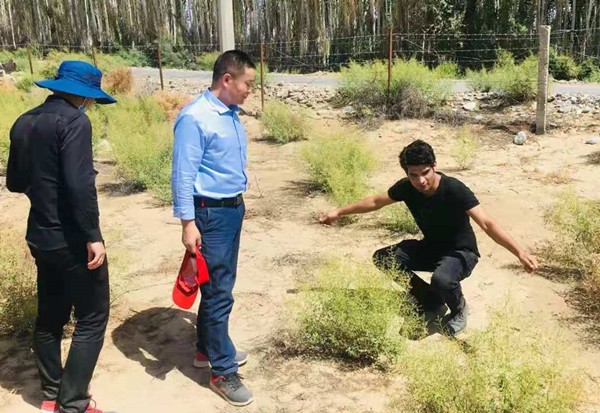The Improving Ecological Environment Helps More People Live a Better Life
2024-05-22
Yellow sand stops and a large area of grass and shrubs comes into sight near the Cele Desert Research Station of the Xinjiang Institute of Ecology and Geography (XIEG) of the Chinese Academy of Sciences. From “sand forcing humans to retreat” to “trees forcing sand to retreat”, researchers are trying to turn deserts into oases. Akash Tariq, a Pakistani associate professor who has been working at XIEG since 2019, has witnessed this ecological change.
Akash has been engaged in research on plant physiology and ecology as well as plant-soil interactions, intending to enrich desert plant species and promote vegetation restoration through scientific research. “Specifically, my team mainly conducts research in four areas: the process of wind-sand damage and the integration and demonstration of sand prevention and control technologies, adversity adaptation strategies and sustainable management models of desert plants, high-yield and stable yield technology and oasis stability mechanism of oasis farmlands, and the development and large-scale application of key technologies in the desert ecological industry”, Akash said. The team also studies the adaptation and response mechanism of the dominant plants in the Taklimakan Desert to water, nutrients, salt and temperature at different growth stages. “We have proposed technical methods and practical approaches for sustainable management of perennial vegetation in extreme arid areas from the perspective of economics and ecology. With the support of scientific research, the local environment has undergone a gratifying change.”
Find together suitable test sites, prepare plots, plant seeds, water regularly, etc. While working at the Cele Desert Research Station, Akash’s team attaches great importance to cooperating with local villagers to conduct research. “They are important participants in ecological protection, and understanding basic knowledge related to ecology helps them to engage more in ecological protection.” To this end, we have held various scientific activities to enhance their understanding and teach them how to keep these plants growing and make ecological management more sustainable.”
In his communication with local villagers, Akash felt the positive impact of ecological improvement on the livelihood and economic development in Xinjiang. “By promoting technologies such as mobile dune control, herba cistanche inoculation, and two-layer two-seedling high-yield cultivation of cotton, an increasing number of villagers have begun to plant special economic plants, such as forest fruit and herba cistanche, which can not only enhance windbreak and sand fixation, but also develop industries.” With the continuous improvement of the ecology, the local desert tourism industry has flourished and created more jobs. “The economic plants have been grown. It has become greener. Local tourism has developed, and the ecological improvement has helped more people live a better life”, Akash said.
One of the key tasks of Xinjiang’s ecological construction is to fully complete the desertification prevention and control in the Hexi Corridor and the edge of the Taklimakan Desert this year, to effectively improve the ecological environment in southern Xinjiang. This goal is highly in line with Akash’s career plan. “I want to further explore different topics in my field of research. China provides a broad stage for me to realize my dream and I hope to continue my research work here.” In terms of future research priorities, Akash is highly motivated to study with his team the stability mechanism of the desert-oasis transition zone and its sustainable management techniques to provide scientific and technological support for the conservation and restoration of fragile ecosystems in arid areas.
Excerpt from “China’s Western Development in the New Era in the Eyes of Foreign Friends: Open Innovation, Improving Ecological Environment”, originally published in People’s Daily authored by Li Yanan.

Selecting experimental field at the Cele Station (Image courtesy of Akash Tariq)
Contact
LONG Huaping
Xinjiang Institute of Ecology and Geography
E-mail: longhp@ms.xjb.ac.cn



